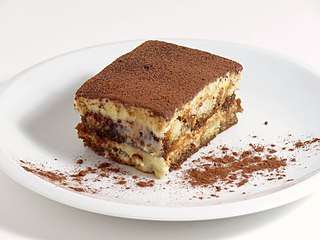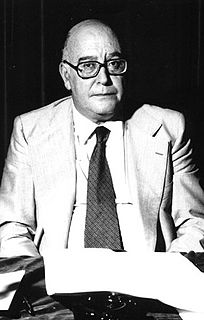
The Ku Klux Klan, commonly shortened to the KKK or the Klan, is an American white supremacist, right-wing terrorist, and hate group whose primary targets are African Americans, Jews, Latinos, Asian Americans, and Catholics, as well as immigrants, leftists, homosexuals, Muslims, abortion providers and atheists.

Tiramisu is a coffee-flavoured Italian dessert. It is made of ladyfingers (savoiardi) dipped in coffee, layered with a whipped mixture of eggs, sugar, and mascarpone cheese, flavoured with cocoa. The recipe has been adapted into many varieties of cakes and other desserts. Its origins are often disputed among Italian regions Veneto and Friuli Venezia Giulia.

Chatsworth House is a stately home in the Derbyshire Dales, 3.5 miles (5.6 km) north-east of Bakewell and 9 miles (14 km) west of Chesterfield, England. The seat of the Duke of Devonshire, it has belonged to the Cavendish family since 1549. It stands on the east bank of the River Derwent, across from hills between the Derwent and Wye valleys, amid parkland backed by wooded hills that rise to heather moorland. The house holds major collections of paintings, furniture, Old Master drawings, neoclassical sculptures and books. Chosen several times as Britain's favourite country house, it is a Grade I listed property from the 17th century, altered in the 18th and 19th centuries. In 2011–2012 it underwent a £14-million restoration. The owner is the Chatsworth House Trust, an independent charitable foundation, on behalf of the Cavendish family.
The Sicilian Mafia, also simply known as the Mafia and frequently referred to as Cosa nostra by its members, is an Italian Mafia-terrorist-type organized crime syndicate and criminal society originating in the region of Sicily and dating to at least the 19th century. It is a loose association of criminal groups that share a common organisational structure and code of conduct and honor and present themselves to the public under a common brand. The basic group is known as a "family", "clan", or cosca. Each family claims sovereignty over a territory, usually a town or village or a neighbourhood (borgata) of a larger city, in which it operates its rackets. Its members call themselves "men of honour", although the public often refers to them as mafiosi. By the 20th century, following wide-scale emigration from Sicily, mafiosi established gangs in North and South America which replicate the traditions and methods of their Sicilian ancestors. The Mafia's core activities are protection racketeering, the arbitration of disputes between criminals, and the organizing and oversight of illegal agreements and transactions.
The Black Mafia, also known as the Philadelphia Black Mafia (PBM), Black Muslim Mafia and Muslim Mob, was a Philadelphia-based African-American organized crime syndicate. The organization began as a small criminal collective, known for holding up neighborhood crap games and dealing in the illegal drug business, but at its height of operation in the early 70s until about the early 1980s, it managed to consolidate power and control a large portion of criminal activity in various African-American neighborhoods throughout Philadelphia, the Delaware Valley, and South Jersey, including Atlantic City and Camden. In addition to drug trafficking, burglary, and armed robbery, the Black Mafia was also engaged in traditional organized crime activities such as extortion, racketeering, prostitution, loansharking, number running and other illegal gambling rackets.

Tim Janus is an American entertainer, media personality and retired competitive eater known in the competitive eating community as "Eater X". He is a member of the International Federation of Competitive Eating (IFOCE). He always performs in contests wearing a painted mask and once stated, "I'd eat anything. One of my goals in life is to eat everything in the world at least once. I'd eat a roll of pennies if I thought I could set a world record. Some day I hope we make contact with beings from other planets. I'd love to eat alien."

The Sicilian Mafia Commission, known as Commissione or Cupola, is a body of leading Sicilian Mafia members to decide on important questions concerning the actions of, and settling disputes within the Sicilian Mafia or Cosa Nostra. It is composed of representatives of a mandamento that are called capo mandamento or rappresentante. The Commission is not a central government of the Mafia, but a representative mechanism for consultation of independent Mafia families who decide by consensus. "Contrary to the wide-spread image presented by the media, these superordinate bodies of coordination cannot be compared with the executive boards of major legal firms. Their power is intentionally limited [and] it would be entirely wrong to see in the Cosa Nostra a centrally managed, internationally active Mafia holding company," according to criminologist Letizia Paoli.

Ikechukwu Uche is a Nigerian professional footballer who plays as a striker.

I cento passi is an Italian film released in 2000, directed by Marco Tullio Giordana about the life of Peppino Impastato, a left political activist who opposed the Mafia in Sicily. The story takes place in the small town of Cinisi in the province of Palermo, the home town of the Impastato family. One hundred steps was the number of steps it took to get from the Impastato house to the house of the Mafia boss Tano Badalamenti. The film has been released on Regions 2 and 4 DVDs but a Region 1 release has yet to be made.
The Detroit Partnership is an Italian-American organized crime syndicate based in Detroit, Michigan, and mainly operates in the Greater Detroit area as part of the larger Italian-American Mafia. They hold interests in Windsor, Ontario, Toledo, Ohio; as well as other cities in Michigan, Ohio, West Virginia, Nevada, and Sicily.

The Lockheed Martin shooting occurred on July 8, 2003, at the Lockheed Martin plant in Meridian, Mississippi. The gunman, Douglas Williams, an assembly line worker at the plant, shot 14 of his co-workers with a shotgun, killing six of them, before committing suicide. After the shooting, information surfaced depicting Williams' history of making threats and racist comments directed at African-American coworkers. Five of the six killed in the incident were black.
Raylawni Branch is a black Mississippi pioneer of the Civil Rights Movement, a professional nursing educator and US Air Force Reserve officer. She is best known for her leading role in the integration of the University of Southern Mississippi (Hattiesburg) in 1965, which was peaceful as opposed to the violent riot triggered by white racism after the enrollment of James Meredith at the University of Mississippi (Oxford) in 1962.
Uche Innocent Nwofor is a Nigerian footballer who plays as a striker. He is currently unattached.

Black Hand extortion was a criminal tactic used by gangsters based in major cities in the United States. In Chicago, Black Hand extortion began around 1900 and had all but faded away by 1920, replaced by the Mafia. The Mafia was initially organized by Johnny Torrio and further organized by Al Capone into the extant Chicago Outfit sometime later. Black Handers in Chicago were mostly Italian men from Calabria and Sicily who would send anonymous extortion notes to their victims emblazoned with a feared old country symbol: the "Black Hand". The Black Hand was a precursor of organized crime, although it is still a tactic practiced by the Mafia and used in organized crime to this day. The Black Hand gangsters of this time period differed from the Mafia by lacking formally structured hierarchies and codes of conduct, and many were essentially one-man operations. Black Hand blackmail was also common in New York, Boston, and New Orleans. Victims would be threatened with being beaten, shot, or have their place of business bombed if they did not pay. Starting around 1909, Black Hand activity was causing difficulties for mob boss Big Jim Colosimo, a former Black Hand gangster and owner of brothels throughout Chicago. Colosimo's life was being threatened with demands for cash to ensure his physical safety. In an effort to fix the problem, he recruited Johnny Torrio, who was a member of New York's Five Points Gang at the time, to come to Chicago. Torrio would later become the famous successor to Big Jim Colosimo and mentor Al Capone as the organized crime ruler of Chicago.
Giovanni Bonomo was a member of the Sicilian Mafia. He was on the "most wanted list" of the Italian ministry of the Interior since 1996 for two murders, drug trafficking and money laundering, and Mafia association, until his arrest in Senegal in November 2003.
Mariano Tullio Troia was a member of the Sicilian Mafia. He was on the "most wanted list" of the Italian ministry of the Interior since 1992 until his arrest in Palermo in September 1998.

The Meridian race riot of 1871 was a race riot in Meridian, Mississippi in March 1871. It followed the arrest of freedmen accused of inciting riot in a downtown fire, and blacks' organizing for self-defense. Although the local Ku Klux Klan (KKK) chapter had attacked freedmen since the end of the Civil War, generally without punishment, the first local arrest under the 1870 act to suppress the Klan was of a freedman. This angered the black community. During the trial of black leaders, the presiding judge was shot in the courtroom, and a gunfight erupted that killed several people. In the ensuing mob violence, whites killed as many as 30 blacks over the next few days. Democrats drove the Republican mayor from office, and no person was charged or tried in the freedmen's deaths.

Black Hand is a 1950 American film noir directed by Richard Thorpe and starring Gene Kelly as an Italian immigrant fighting against the Black Hand extortion racket in New York City in the first decade of the 20th century.

The Family is a 2013 black comedy crime film co-written and directed by Luc Besson, starring Robert De Niro, Michelle Pfeiffer, Tommy Lee Jones, Dianna Agron, and John D'Leo. It follows a Mafia family in the witness protection program who want to change their lives. It is based on the French novel Malavita by Tonino Benacquista.
The Minore Mafia clan is a historical Sicilian Mafia clan originating from the city of Castellammare del Golfo on Sicily's west coast. It was probably founded sometime at the start of the 20th century, it later came to control the city of Trapani and held considerable influence throughout the entire province, and also in Palermo and Catania. They historically maintained good relations with the Buccellato Mafia clan, which also hailed from Castellammare del Golfo.












